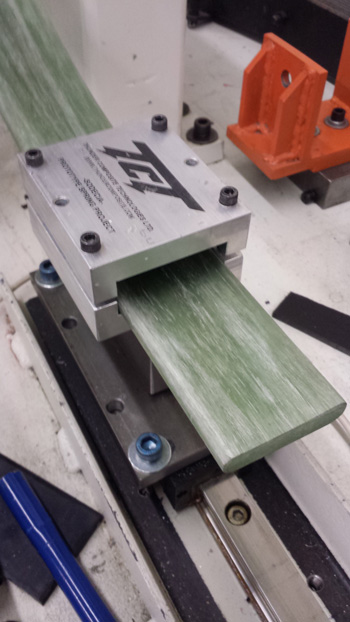
Thunder Composites unfazed by supply chain issues, signs major deal with U.S. defence contractor
by Sadi Muktadir

The pandemic had a minimal interruption on TCT's supply chain and in servicing its U.S. clients.

Thunder Composites unfazed by supply chain issues, signs major deal with U.S. defence contractor
Thunder Composites’ recently designed-and-manufactured suspension system for armoured vehicles has helped to secure a manufacturing deal south of the border over the summer that is a multi-year contract valued at seven figured in USD.
Thunder Composites (TCT), a subsidiary of Harbour Technologies, is an OEM based out of Windsor, Ont., manufacturing materials and parts for the armoured vehicle manufacturing industry and supplying a variety of clients globally.
Their suspension system drew the attention of U.S. defence contractor General Dynamics Land Systems, who noted a unique and automated manufacturing process for leaf springs.
“Through multiple channels in the automotive industry, we were able to connect with the defence contractor and we became the go-to for high-strength composites engineering and redevelopment of steel components into composites,” says TCT President Andrew Glover.
TCT is also in the business of manufacturing hoods, roof structures, carbon fibre oil pans and other parts, all in effort to make armoured vehicles lighter without losing any of its structural integrity.
The leaf springs are a suspension component that unlocks a huge weight savings for an armoured vehicle.
“You can have the payload capacity, travel and the same benefits of a coil spring with the advantages of weight savings, higher impact strength, infinite shape memory and corrosion resistance due to its composite material.”
The defence industry’s primary focus is also on the electrification of the armoured vehicle industry, according to Glover.
“Electric tank systems, marine warfare components are all going electric. Whether you’re powering an entire vehicle or trying to create more range for it, reducing the vehicle’s weight will also reduce the energy taken to run an electric armoured vehicle.”

According to Glover, what separates TCT from some of the other composites manufacturers in the same space, is that the newer players are coming from an aerospace manufacturing background, and TCT’s automotive background allows it to understand production at a higher scale and better price point for clients.
TCT also mentions that the pandemic had a minimal interruption on its supply chain and in servicing its U.S. clients. Andrew Glover mentions that being part of the CUSMA trade agreement and abiding by controlled goods regulations has actually helped them be part of a resilient and reliable supply chain that has avoided disruptions.
Clients in the weapons and defence industry often have strict protocols and requirements, and being able to meet them has meant that OEMs like TCT can circumvent supply issues with a steady, stable and secure stream of parts and components.
“The defence industry has really shifted to focus on light-weight vehicles so business has actually picked up for us,” says Andrew.
Business-as-usual and no material delays due to COVID-19, according to the Thunder Composites team. If this is a trend that continues, they are poised for a healthy 2022.